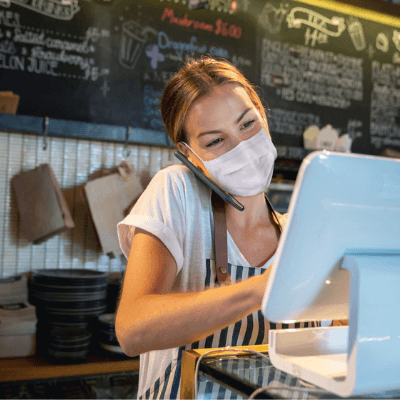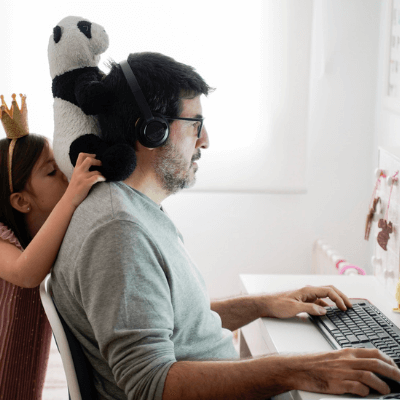Workplaces are forever changed, so how can business owners create an environment for success in 2021?
- Businesses need to take a long-term view on how they work in a COVID-19 world
- Involving staff in decisions about the workplace is critical
- Employers need to have a heightened state of awareness when it comes to the wellness of their staff.
COVID-19 is a fact of life. It’s now clear it’s not a short-term problem that’ll be easily cleared up – it’s something we’ve all got to live with for the foreseeable future.
For businesses that were forced to react and put in place temporary measures to simply survive during 2020, the challenge this year is going to be how to create a long-term COVID-safe workplace that promotes and supports employee wellness and enables the business – and individuals – to flourish.
This applies to all business, whether office-based, retail, a factory, or a mobile service. And while creating a COVID-safe workplace is the focus now, these changes are going to stay with us as we come to terms with the seismic shift in the way we live and work.
"Firstly, you’ve got to have a procedure for how you are going to work – how you’re going to work remotely, how you’re going to work from the office or other workplace, how you’re going to handle things like travel and sanitation and how that may change depending on government advice,” says Rob Kosova, General Manager of People Risk at QBE.
“This uncertainty is going to be ongoing, so it’s vital that businesses take time to put those documents together, such as a working from home checklist, policies, and risk management at the workplace, at home or on the road – in consultation with their workforce.”
That consultation with staff about all aspects of business is critical, believes Anna Feringa, Head of Mental Health & Principal Consultant at Jonah Group, and the more open and consistent the conversations, the better outcomes for all.
“We’re all walking a tightrope at present, so businesses need to stay connected with their staff, and involve them in decisions about the workplace,” she says.
While last year there were prolonged spells of working from home for many people, Kosova believes businesses need to focus on creating a combination of the two environments where it allows, during and post-COVID.
“We’re never going to go back to permanently in the office, and we’re never going to remain entirely work from home either because you lose personal connections,” he says.
While video calls have become part and parcel of our days, the genuine face-to-face connection cannot be completely replaced digitally.
“Being in the same room as your colleagues naturally leads to storytelling,” says Kosova.
“Those types of conversations are part of our rituals and routines, and we need to up our storytelling and encourage it in a digital sense too.”
Operational success in 2021
Safety and feeling secure has become a key factor in most people’s lives. Many are now making decisions through a COVID lens – from wearing masks to checking-in to venues and deciding to attend gatherings and events.

Kosova believes that businesses should be considering how contact-tracing and potentially QR codes demonstrates to their employees that their safety is being taken seriously and that they’re not abdicating responsibility to the government.
“Organisations have to be willing to get more active in this and, if circumstances allow, even be prepared to make their own arrangements for COVID testing via a GP and approved pathology provider,” he says.
“It’s the organisation who wears the reputational and operational risks if they don’t take government rules seriously, it can be shut down and suffer reputational damage.
“We’re going to be living with this for a while yet, so organisations have to be prepared with their own risk management plans - with consultation and communication happening with stakeholders before, during and after impacts occur. “
In addition, says Feringa, some information that’s currently ‘private’ may need to be shared.
“For example, employees’ contact details and next of kin information are traditionally under lock and key in the HR department.
“Imagine if you’re talking to one of your employees online and all of a sudden they’re clutching their chest. You need to get them help straight away, but you can’t because right now you may not have access to the employee’s location or their co– resident.”
Focus on wellbeing
The wellbeing of employees is critically important for businesses to succeed, says Feringa – and the advocacy for this needs to come from the top.
“Businesses need all of the organisational aspects of creating a COVID-safe environment in place, but they need equal focus on the wellbeing of their employees.
“Every individual is different – some may enjoy working from home, for others it may be really challenging. Likewise, some may relish coming into the office, while others will feel the opposite.”
And if working from home isn’t an option, it’s important that employees genuinely feel that their health and safety is being considered by their employer.
“Therefore, it’s so important to have a culture of openness, of being able to voice concerns, share your thoughts and feelings, and being listened to,” Feringa said.

“As managers and leaders of people, if we understand what our teams are going through, how they’re feeling and viewing things, we can help.”
Creating the understanding that it’s OK to talk and voice concerns is more important than ever, says Feringa, because people might be increasingly reluctant to do so, given their reliance on employment.
“For many of us, our jobs and income are the most important things to protect after our health and family. If I’m feeling mentally unwell, and I’m walking into a business that doesn’t support me, I’m going to keep my mouth shut for fear of losing my job – and ultimately that’s going to have an impact on my performance and my behaviour.”
For managers, it’s important to increase formal and informal communications with team members, says Feringa, and those conversations can help create situations in which people are more willing to share information.
And, while we’re used to identifying warning signs of deteriorating wellbeing in a person – for example, consistently turning up to work late, not engaging in meetings or conversations – we need to be aware that there are also warning signs when operating in an online environment.
“If your workplace is operating from home, things to watch out for include not engaging in video meetings, turning the camera off, and maybe an undertone in an email. As managers, we have to live in a heightened state of care.”
Ultimately, as businesses progress through 2021, there needs to be a long-term view of managing risks across the whole organisation.
By listening to employees and involving them in the creation of processes and procedures, businesses can produce an environment that can flourish in 2021.
